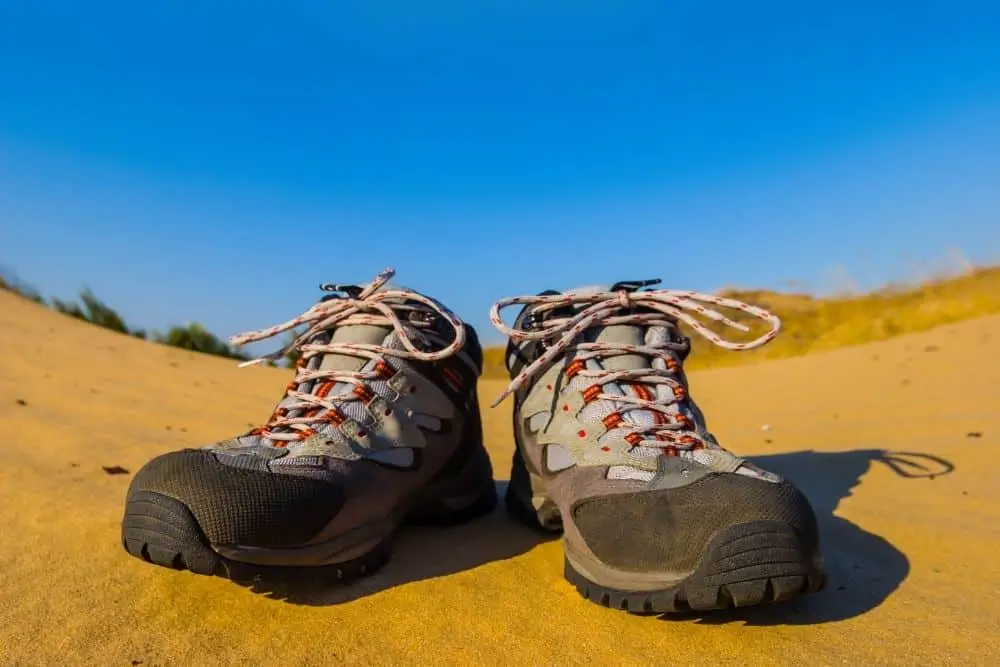We get that hiking boots are different from regular walking shoes, but why are they so heavy? Generally, hiking boots’ weight varies; you could see some weigh between 1lbs and 4lbs.
In fact, hiking boots are usually heavier than walking shoes, and manufacturers have reasons for making them weigh that much. Several factors contribute to how much weight a pair of hiking boots have.
Weight matters a lot when it comes to hiking, be it on your back or legs. For instance, too much weight can be killing, and a small weight may not give enough protection and support.
So, why should you bear the weight of hiking boots? This article will discuss why hiking boots are so heavy and the downsides to their heaviness.
Let’s begin.
Contents
Why Are Hiking Boots So Heavy?
The major reason hiking boots are so heavy is that manufacturers make them according to the conditions hikers will face.
Therefore, they have to be suitable for that purpose. Apart from that, hiking boots are heavy because of the following reasons:
1. The boot’s upper material
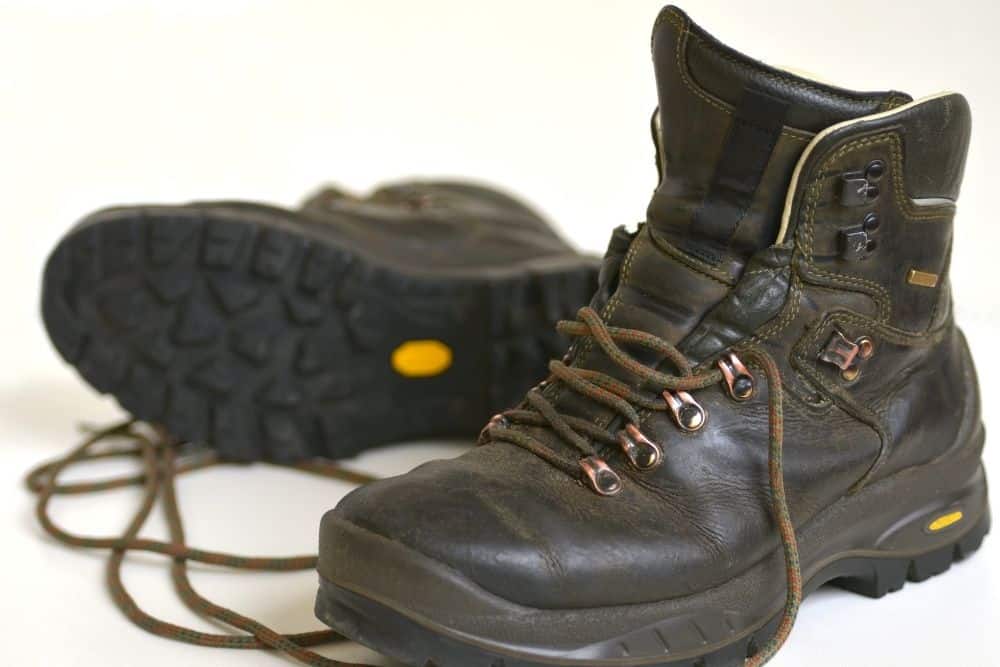
Manufacturers make hiking boot’s upper from different materials, and depending on which, they contribute to hiking boots’ overall weight.
For instance, hiking boot materials vary from leather to synthetic, and both have other variances.
Full-grain leathers are more rigid and heavier than other leather and synthetic forms. So, if your boot upper material is leather, then they would be heavier than others.
2. Choice of design
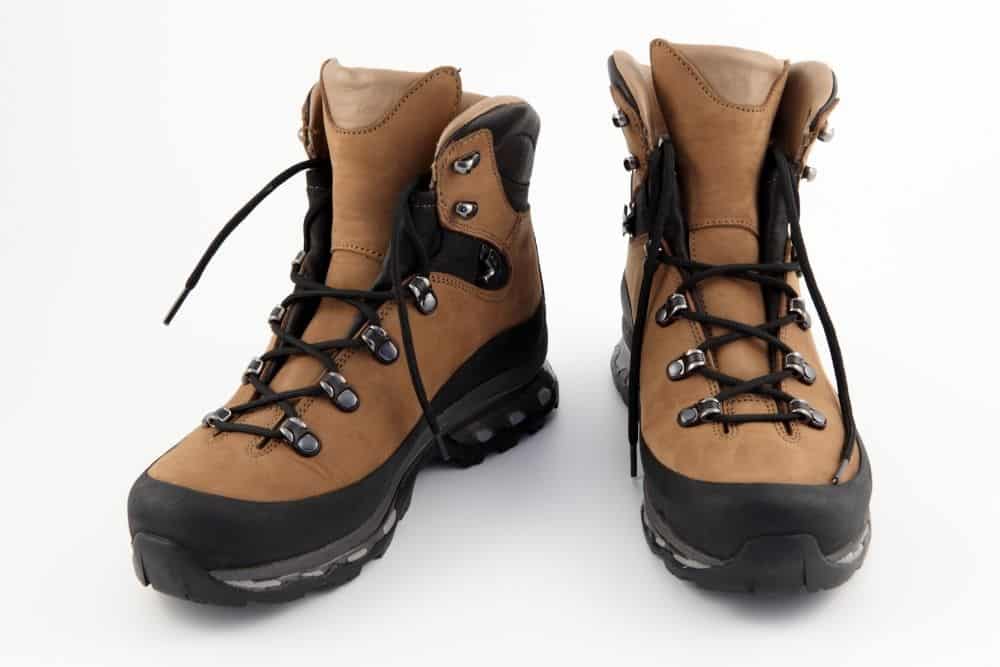
Hiking boot designs contribute to their weight. That is, manufacturers design hiking boots in different forms. For instance, you’ll see low-cut, mid-cut, and high-cut designs.
Low-cut designs have lower uppers while high-cut designs have taller uppers and these almost little details contribute to hiking boots’ weight.
How? The higher the cuts are, the more ankle support and weight they add. So, manufacturers consider this when making hiking boots.
3. Added Insulation
Another reason hiking boots are heavy is their insulation. Insulation differs in different hiking boots as some have more than others.
Regardless, manufacturers add this feature to hiking boots to provide warmth and comfort for the feet, primarily during the winter. In addition, they ensure that your feet stay warm but not to cause sweating.
So for them to achieve this effect, they use different materials, some thinner than the other. So, by logic, the heavier the material, the more weight they add to your hiking boots.
And if the insulation has more than a layer, that’s more weight for your hiking boots.
4. The included toe caps
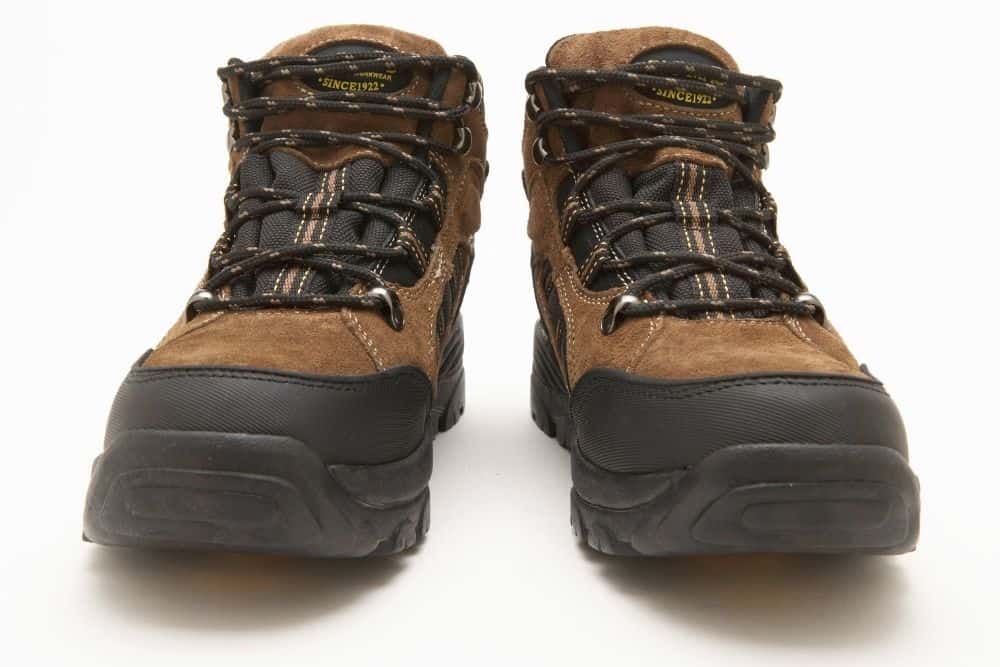
Toe caps are other features that can make your hiking boots weigh more. Although manufacturers include this feature to provide more protection for your feet, they also weigh something.
Generally, toe caps ought to protect the top of your feet against impacts that could hurt them. Furthermore, manufacturers make toe caps from different materials, ranging from rubber or composite, for maximum protection.
Even though most hiking boots have rubber toe caps, they still contribute to the overall heavyweight feeling.
In addition, the kind of material manufacturers make toe caps from also contributes to how heavy they are.
For example, steel toe caps weigh more than rubber. So, if you want to cut on weight, you’d better go for rubber toe caps.
5. The outsole
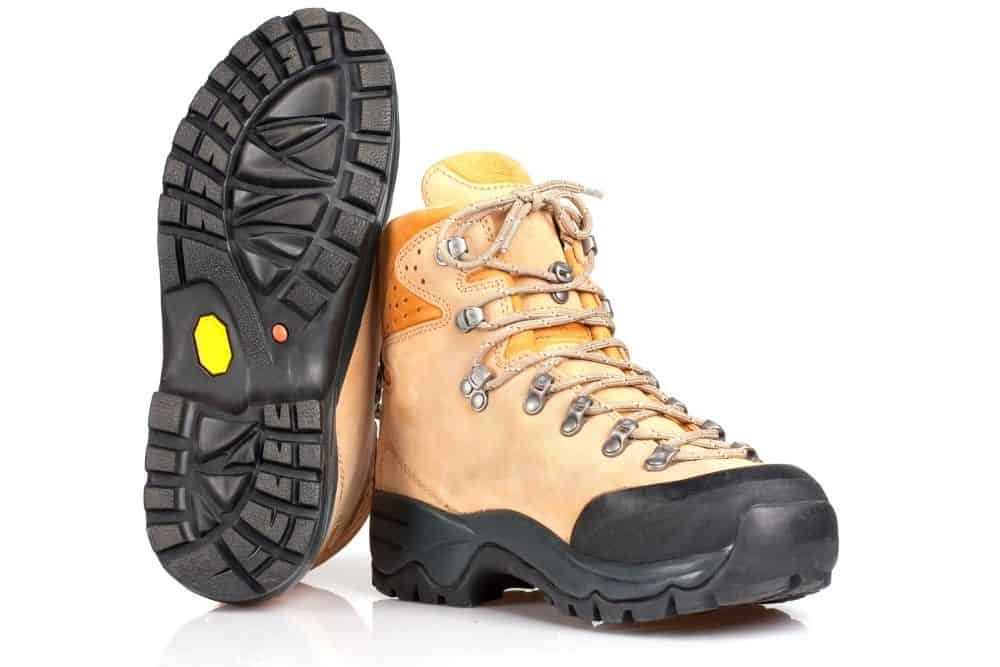
Hiking boot outsoles also contribute to their weight. How? Manufacturers make hiking boot’s outsoles from rubber, and depending on their size, they add more weight to hiking boots.
Hiking boot’s outsoles are undebatable because you need them for different reasons.
First, they help provide the proper elevation for your feet and ensure that your feet grip hiking terrains alright. So, the outsole is one additional weight you need on your hiking boots.
6. The shank
Another thing that makes hiking boots heavy is the shank. Shanks can be plastic or steel, and depending on the kind of manufacturer, they can be long or short.
As you know, steel weighs more than plastic, so if your hiking boots, especially mountaineering boots, have steel shanks, be ready to drag the weight.
Shanks aren’t useless because manufacturers include them between the insoles and outsoles to make hiking boots more stiff and supportive. So, long and steel shanks make your hiking boots weigh more.
7. They are wet or soaked
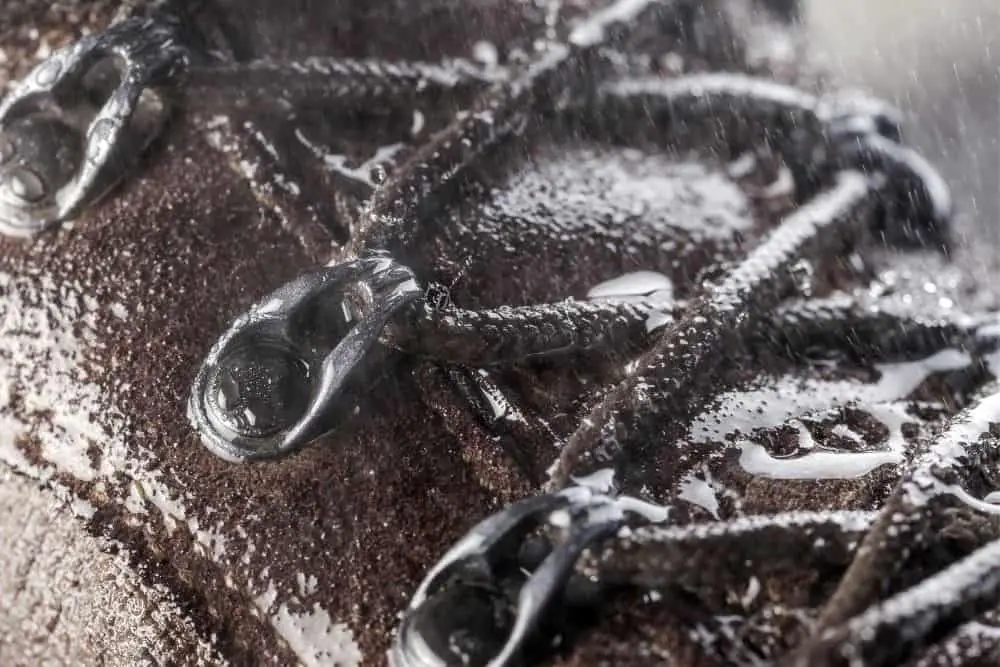
Like it or not, the reason why your hiking boot feels heavy might not really be because of the features. For instance, you might have a lightweight hiking boot, but it will still feel heavy on the feet when it’s wet or soaked.
The presence of water on the foot increases the overall weight, which makes it pretty heavy. The best way to overcome this weight, if it bothers you, is to let it dry out before proceeding.
8. It might be sand-filled
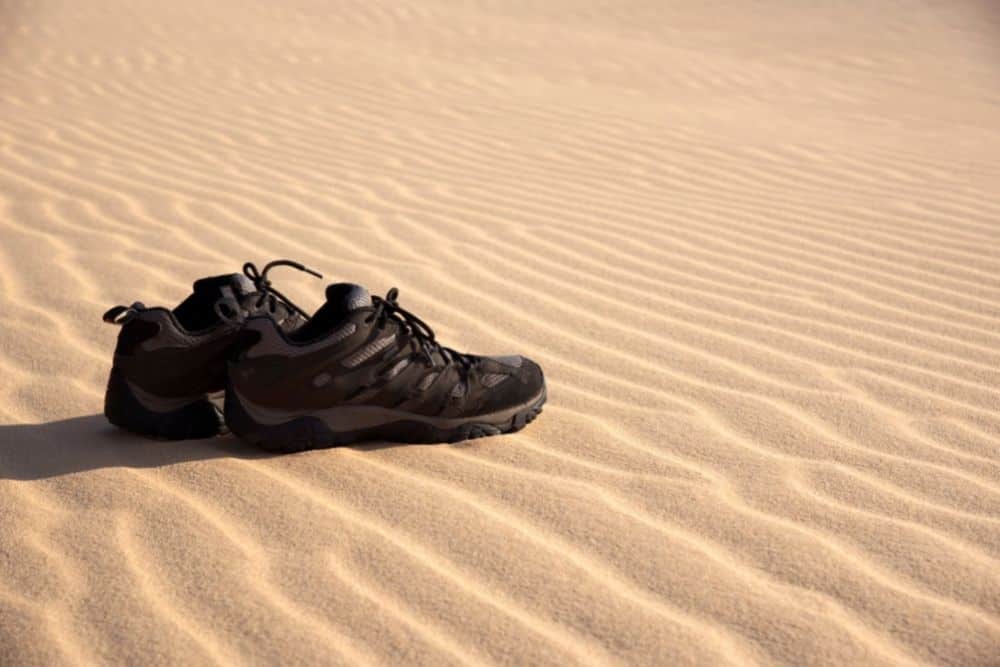
Usually, this is a rare occurrence when hiking, but it’s quite possible. For instance, when you hike in an area like Joshua Tree or anywhere having sandy terrains, the sands might get into the boot – thereby increasing the weight.
Although your hiking boot might fit snugly, there are still chances of sandy particles slipping through tiny gaps between your feet and the collar.
The best way to overcome this problem when hiking, you should watch your steppings carefully to avoid sands from getting into your hiking boots.
Pros of Heavy Hiking Boots
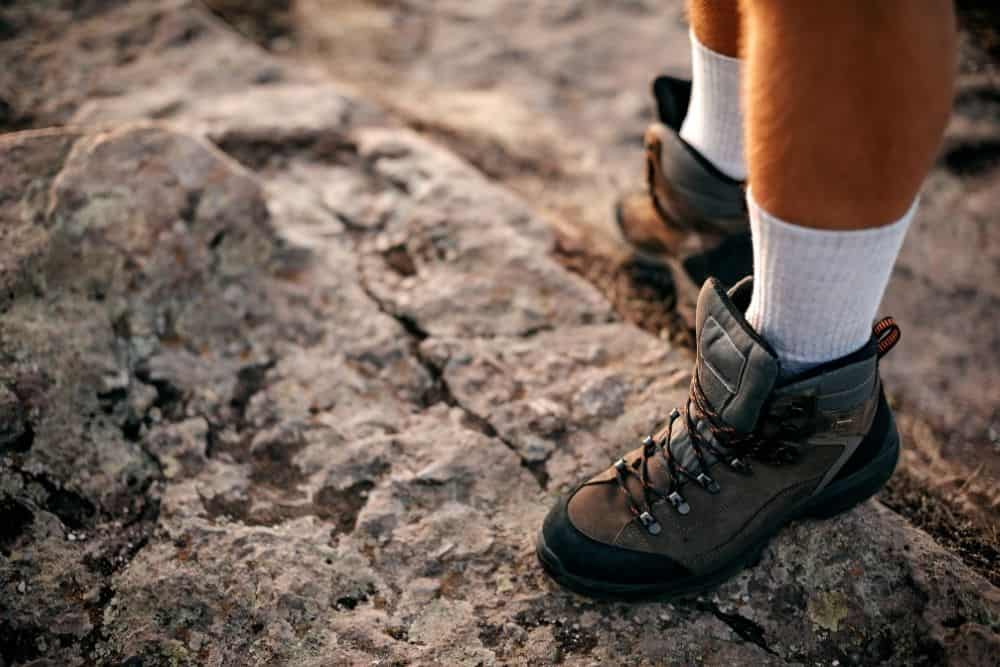
Provide ankle support and protection
One major benefit of heavy hiking boots is the ankle support and protection they give. Manufacturers tend to put in many features like high-cut collar and toe caps that will boost its overall weight.
Plus, When the boots fit snugly around your feet, you can be sure to get enough protection while hiking.
They keep your feet warm
Another benefit of heavy hiking boots is that they keep your feet warm when hiking. This is thanks to the insulation features present in hiking boots. And as earlier stated, heavy hiking boots tend to come with rarely seen features, in this case, insulation.
Another thing is that manufacturers make them in such a way that your feet don’t sweat much due to the warmth. If you wear moisture wicking socks in your boots, that even makes them better.
They’re durable
Heavy hiking boots are durable and have a longer lifespan than other walking footwears. The kind of material used for the uppers contribute to their durability.
For instance, leather materials are stiffer and tougher and tend to be more durable than other materials. So, while the weight might be a bit much for you to bear, you can wear your hiking boots for more miles than walking shoes.
Good traction
Heavy hiking boots provide great traction when you’re hiking. And this is due to the high-quality material used to design the outsole; for instance carbon rubber.
With the way manufacturers design them, they help you stay stable when hiking. Also, they help protect you from slipping on hiking terrains. They make your hiking boots sturdy and feel great.
Cons of Heavy Hiking Boots
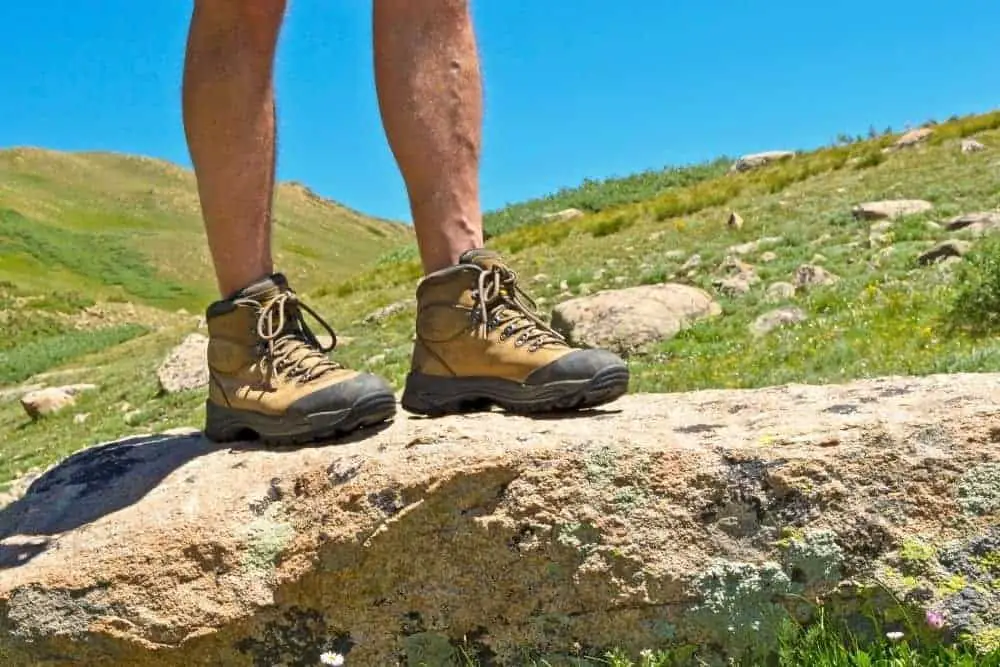
Heavy and would tire you easily
One disadvantage of heavy hiking boots is their weight. Due to their weight, you may get tired quicker when hiking. When you combine them with other weights on your body, you may have to stop at intervals to regain your strength, which makes hiking less fun.
They take time to dry
Heavy hiking boots take time to dry, especially if their material is leather. Leather, especially full-grain, is stiffer and heavier than others; hence longer drying period.
They’re stiff
Heavy hiking boots are stiffer than regular walking shoes. Their uppers, shanks, and design make them stiff. For instance, leather is stiffer than other hiking boots materials and may not allow you to flex your feet the way you want to.
So, while you have to deal with their weight, you have to deal with their stiffness as well and that could be problematic. As you already know, heavy hiking boots are stiff which makes it harder for them to break in easily..
Due to their stiffness, you may not enjoy hiking as you should, because they could make you uncomfortable. You’d have to wear them for a while before they break in or try some quick methods to get them to soften.
Not bring enough breathability
For some hiking boots having layers of padding, they may not be breathable for every weather. While you need enough warmth when hiking for the cold season you may desire something cool and fresh during hot time.
Your feet may end up sweating way too much in your heavy hiking boots making your feet suffer from breathlessness and lack ventilation in and out when hiking. As a result, your skin may feel irritable, or you could get blisters or smelly feet.
When you combine all that discomfort with the weight, you may be tempted to go for boots or shoes that don’t weigh as much.
Conclusion
Hiking boots’ weight can be problematic. And for a long time, it has made many people wonder why hiking boots have to be so heavy.
As earlier stated, hiking Boots can weigh between 1lbs to 4lbs, and they could make hiking tedious for you. However, hiking boots’ weight isn’t deliberate, but they need to be heavy due to their features.
First, hiking boots are heavy because of the kind of work people need them for. Also, they are heavy because of their different features.
In this article, we discussed how each feature contributes to hiking boots’ weight alongside their benefits. Likewise, we discussed the cons of having those extra weights on hiking boots.
Finally, know that you can’t do much about hiking boots weight. But instead, you can buy ones that don’t weigh much depending on the hiking trail or weather condition you intend for them.
Related post: How Heavy Should Hiking Boots Be?

